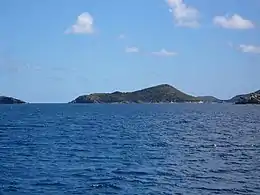George Dog Island
George Dog is an uninhabited island of the British Virgin Islands in the Caribbean. It is located in a smaller sub-group of islands referred to as "The Dogs" (which include Little Seal Dog Island and West Dog Island) to the northwest of Virgin Gorda.
 George Dog Island. Virgin Gorda is visible in the background, and West Dog (on the right) and Great Dog (on the left) can also be seen. | |
 George Dog Island The location of George Dog Island within the British Virgin Islands  George Dog Island George Dog Island (Caribbean) | |
| Geography | |
|---|---|
| Location | Caribbean Sea |
| Coordinates | 18.4928°N 64.4571°W |
| Archipelago | Virgin Islands |
| Administration | |
United Kingdom | |
| British Overseas Territory | British Virgin Islands |
| Demographics | |
| Population | 0 |
| Additional information | |
| Time zone |
|
| ISO code | VG |
On the northwest side of the island is a popular diving site is known as "Bronco Billy", so named because of the surge which carries divers through a box canyon is thought to be similar to riding a bucking Bronco (it is believed that the name pre-dated the 1980 film of the same name). The site achieved a degree of fame when Jacques Cousteau declared it to be his favourite site in the Territory, ahead of more famous dive sites like the Wreck of the Rhone and The Indians.
The island provides habitat for the crested anole (Anolis cristatellus wileyae),[1] Puerto Rican ground lizard (Ameiva exsul) and the big-scaled least gecko (Sphaerodactylus macrolepis macrolepis).[2] The island's flora includes copperwood (Bursera simarouba) and seagrape (Coccoloba uvifera).[2]

References
- Schwartz, Albert; Thomas, Richard; Ober, Lewis D. (1975). First supplement to a check-list of West Indian amphibians and reptiles. Pittsburgh: Carnegie Museum of Natural History. pp. 12-13. ISSN 0145-9031. OCLC 886468503.
- Heatwole, Harold; Levins, Richard; Byer, Michael D. (July 1981). Atoll research bulletin - Biogeography of the Puerto Rican bank. 251. Washington D.C.: The Smithsonian Institution. pp. 27, 33–4, 36, 46. OCLC 45726059.
Further reading
- Wells, S.M. (1988). Coral Reefs of the World. Volume 1: Atlantic and Eastern Pacific. UNEP/IUCN. p. 75. ISBN 2880329434. OCLC 916128569.